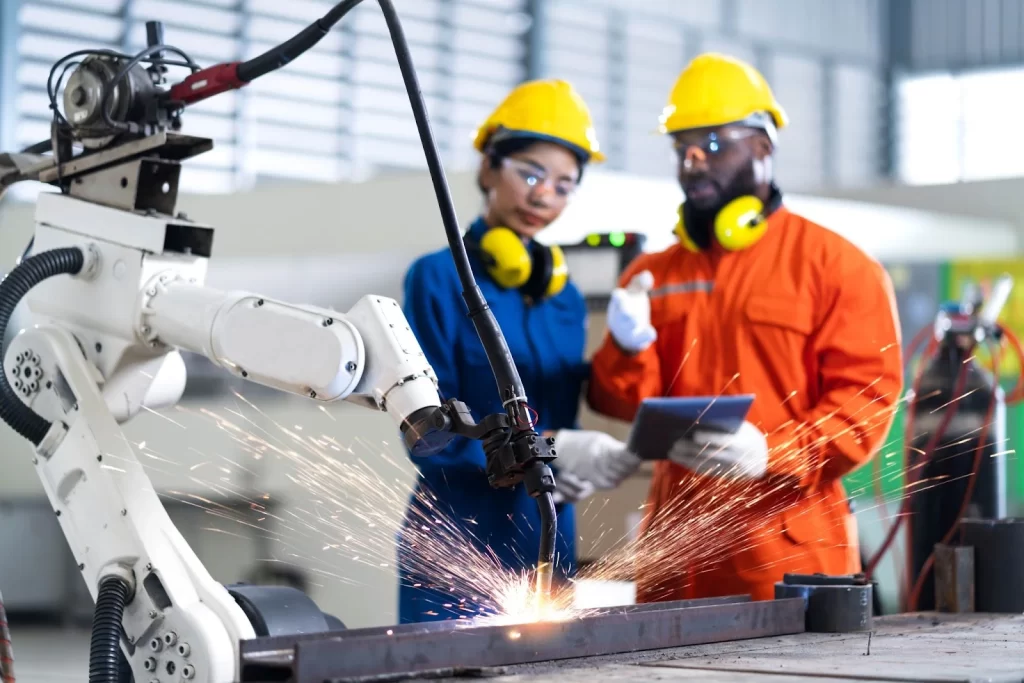The Australian economy is witnessing a significant shift towards the blue-collar workforce, driven by the increasing prominence of trade jobs. This surge in demand, a direct result of extensive government investment in infrastructure and housing, along with a burgeoning market that emphasizes technological advancement and healthcare, not only leads to a substantial skills shortage but also amplifies the necessity for skilled tradespeople across various sectors. Given these dynamics, understanding what trades are needed in Australia becomes crucial for job seekers and employers alike to navigate the evolving job market effectively.
With the rising demand, the future looks promising for new opportunities in the Australian blue-collar landscape, particularly in “Top Trade Jobs.” This blog aims to provide a comprehensive understanding of the leading trade professions in Australia at present. We will also detail how we at DayJob Recruitment support job seekers in navigating and capitalizing on the current job market trends.
Key Takeaways
- The Australian economy is experiencing a significant shift towards the blue-collar workforce due to government investment in infrastructure and housing, and a skills shortage in technology and healthcare sectors, highlighting the growing importance of trade jobs.
- Technological advancements influence trade professions by creating new job opportunities and introducing automation, requiring workers to adapt and collaborate more with technology.
- Globalization and the regional focus of Australia’s trade policies are positioning the country strategically in the Asia-Pacific region, leveraging its proximity to emerging markets and developing domestic capabilities for economic advantage.
- There’s a high demand for skilled tradespeople across various sectors, with electricians, construction managers, plumbers, and IT security specialists among Australia’s top trade jobs, driven by technological advancements and urban development.
- DayJob Recruitment plays a pivotal role in connecting skilled professionals with trade jobs in Australia, offering specialized recruitment services in blue-collar sectors and supporting job seekers and employers in navigating the dynamic job market.
Growing Importance of Trade Jobs

Trade jobs are gaining prominence within the Australian economy. The construction industry, for example, is experiencing substantial demand due to growing infrastructure and housing market stimuli. The skills shortage, especially in areas like technology and healthcare, guarantees ongoing systemic challenges, meaning the demand for skilled tradespeople will likely persist.
Impact of Technology
Technology has significantly impacted trade professions, creating new job opportunities while also introducing automation in some roles. McKinsey’s research indicates that while less than 5% of occupations can be fully automated with current technology, about 60% of all occupations could see at least 30% of their activities automated. This shift necessitates workers to adapt and collaborate more with technology, potentially leading to increased output and productivity.
Despite challenges, technology also creates new jobs in sectors like IT development and hardware manufacturing, with a net positive impact on employment. The digitization of economies presents opportunities and challenges, emphasizing the need for continuous learning and adaptation in the workforce.
Influence of Globalization
Globalization’s influence on the structure of global value chains is particularly relevant to Australia’s status in the field. As globalization shifts towards more knowledge-intensive and regionally focused activities, Australia finds itself in a unique position to capitalize on these changes, especially considering its proximity to emerging markets in Asia and its developed domestic capabilities.
Knowledge-Intensive Activities
With the global shift towards R&D (Research and Development) and design, Australia’s strong educational system and emphasis on innovation position it well to participate in these upstream activities. Australia has a history of contributing to significant scientific and technological advancements, and this trend aligns well with the global movement towards more R&D-intensive industries.
Regional Focus
The country’s geographic location makes it a strategic partner for trade and economic activities in the Asia-Pacific region. The country’s trade policies and agreements with neighboring countries in Asia signify its involvement in the regionalization of global value chains. This regional focus allows Australia to leverage its proximity to rapidly growing markets in Asia.
Domestic Supply Chain Development
Australia’s advanced infrastructure and strong domestic market enable it to develop comprehensive domestic supply chains. This development is essential in an era where regionalization is becoming more prevalent than extended global supply chains.
Skills Demand in New Industries
The shift in global value chains implies a growing need for skills in areas like digital marketing and distribution logistics. Australia’s workforce is well-positioned to adapt to these changes, given its strong educational background and ongoing initiatives in skills development and digital transformation.
Top Trade Jobs in High Demand

With the growing importance of Trade Jobs and technology advancing, this gives rise to more opportunities in the blue-collar sector. Here we present a condensed summary of the most sought-after trade professions currently in Australia’s blue-collar job sector:
| Trade Profession | Industry | Average Pay | Locations with High Demand | Requirements |
| Electricians | Electrical Services | AUD $70,000 to $100,000 | Major cities, developing regions | Electrical trade certification, safety training |
| Construction Managers | Construction | Varies widely; typically AUD $83,000 to $160,000 | Urban development areas, large projects | Diploma in construction management or experience |
| Plumbers | Plumbing Services | AUD $55,000 to $85,000 | Nationwide, urban areas | Plumbing trade certification, apprenticeship |
| Air-Conditioning and Refrigeration Mechanics | HVAC Services | AUD $60,000 to $110,000 | Areas with extreme weather, urban centers | HVAC program, apprenticeship |
| Carpenters and Joiners | Building and Construction | AUD $55,000 to $80,000 | New housing developments, renovation projects | Carpentry skills, apprenticeship, or training |
| IT Security Specialists | Information Technology | AUD $98,000 to $160,000 | Major cities, tech hubs | IT qualifications, cybersecurity experience |
| Logistics and Supply Chain Managers | Logistics and Supply Chain | AUD $62,000 to $150,000 | Ports, industrial hubs, commercial centers | Degree in logistics/supply chain management, experience |
| Welders | Metal Fabrication | AUD $55,000 to $72,000 | Industrial areas, construction sites | Welding certification, metalwork experience |
| Chefs | Hospitality | AUD $50,000 to $70,000 | Tourist destinations, metropolitan areas | Culinary arts degree or apprenticeship, experience |
| Bridge Saw Operators | Manufacturing, Transport & Logistics | AUD $60,000 to $70,000 | Sydney and major cities | Experience in operating bridge saws, machinery handling |
Discover your ideal job match!
Electricians
Electricians are crucial for maintaining and installing electrical systems. Their demand is driven by the increasing reliance on technology, infrastructure projects, and sustainable building practices. With Australia’s focus on renewable energy and smart technology, electricians are in high demand across various sectors.
Construction Managers
These professionals oversee construction projects, ensuring they are completed efficiently and safely. With the growth in urban development and infrastructure spending, construction managers are highly sought after in Australia, particularly for large-scale projects.
Plumbers
Plumbers are essential for the installation and maintenance of water, gas, and sewage systems. Their skills are in high demand due to ongoing urban development and the need for maintenance of existing infrastructure. The growing population and the development of new residential and commercial areas increase the demand for skilled plumbers.
Air-Conditioning and Refrigeration Mechanics
As climate control becomes increasingly important in both residential and commercial buildings, these technicians are needed for the installation, repair, and maintenance of HVAC systems. Their expertise is crucial in a country like Australia, which experiences extreme weather conditions.
Carpenters and Joiners
Involved in both residential and commercial construction, carpenters and joiners are vital for building frameworks and structures using various materials. The ongoing housing developments and construction projects across Australia ensure a steady demand for these skills.
IT Security Specialists
With the digital transformation of businesses and the increasing threat of cyberattacks, IT Security Specialists are critical in protecting digital assets. Australia’s growing IT sector demands skilled professionals in cybersecurity.
Logistics and Supply Chain Managers
These professionals are key in managing the flow of goods and services, especially with the globalization of supply chains. Their role has become more critical in Australia with the rise in e-commerce and the need for efficient distribution networks.
Welders
Welders are needed in various sectors including construction, manufacturing, and infrastructure development. Their skills are essential for projects that require metal fabrication, a common need in Australia’s robust construction and mining industries.
Chefs
With a vibrant food culture and thriving tourism industry, Australia has a steady demand for skilled chefs. The hospitality sector, including restaurants and hotels, consistently seeks talented culinary professionals.
Bridge Saw Operators
Bridge Saw Operators are skilled tradespeople in the manufacturing and logistics sectors, specializing in operating bridge saw machines. These operators are crucial in industries where precision cutting of materials such as stone, metal, and other hard substances is required.
In addition to the demand for these skilled trades, it’s important to recognize the ‘best-paying trades in Australia’ to guide job seekers towards the most lucrative career paths. Professions such as Electricians, Construction Managers, IT Security Specialists, and Air-Conditioning and Refrigeration Mechanics not only offer substantial contributions to the Australian economy but also rank among the highest-paying trades, reflecting the value and necessity of these skills in today’s market.
2024 Trends: Evolving Trades Landscape in Australia
The latest trends and statistics about trades needed in Australia for 2024 highlight significant changes and developments in the industry, driven by advancements in technology, a growing focus on sustainability, and ongoing efforts to mitigate skill shortages. Here’s a summary of key findings:
- Technology Advancements: The trades sector is increasingly influenced by technological advancements, including artificial intelligence and automation. This shift necessitates that job seekers adapt and acquire new digital skills to stay competitive.
- Sustainable Practices: There is a heightened demand for tradespeople knowledgeable in sustainable practices. Proficiency in green building techniques, renewable energy systems, and the use of eco-friendly materials is becoming more valuable.
- Skills Shortage Mitigation: Australia continues to experience a skills shortage in the trades sector. To address this, there will be more apprenticeship programs, training subsidies, and incentives for experienced tradespeople to mentor recruits.
- Enhanced Safety Measures: The emphasis on workplace safety is intensifying. New technologies and a greater awareness of workplace hazards are leading employers to invest more in safety training and equipment.
- Salary Trends and Economic Outlook: The Australian salary budget saw unexpected growth in 2023, with planned median base salary increases of 3% ending up at around 4% due to high employee turnover and inflation. The Wage Price Index also showed significant growth, indicating a robust labor market. Despite economic uncertainties, median merit salary increase projections for 2024 remain at around 3.5%. However, hiring plans are expected to be cautious, with Australia’s unemployment rate projected to rise to 4.5% by the end of 2024.
- Hiring and Retention Challenges: Hiring and retention are anticipated to remain key concerns in 2024. Difficulty in hiring or retaining employees in specific roles, particularly in sales, marketing, product management, engineering, science, IT, and skilled trades, is reported by a significant number of organizations.
These trends suggest a dynamic future for trades in Australia, with opportunities for those who can adapt to technological advancements, embrace sustainable practices, and leverage available training and development programs. Additionally, the economic outlook and salary trends indicate a competitive but cautious hiring environment, with an emphasis on retention and skill development.
The Role of Dayjob Recruitment in the Trade Jobs Demand

At Dayjob Recruitment, we play a pivotal role in meeting the demand for trade jobs in Australia, particularly within the blue-collar sector. Our focus is on aligning skilled workers with suitable job opportunities and aiding employers in their search for the right candidates.
Our Role in the Trade Sector
We specialize in recruiting blue-collar, industry-specific tradespeople. Our expertise extends across various roles in the manufacturing and construction industries, including positions like CNC operators, welders, joiners, and carpenters. This specialization is particularly vital in sectors such as manufacturing and construction, where there is a significant demand for skilled blue-collar professionals.
Our Recruitment Process
Our process is comprehensive and tailored to meet the unique demands of the blue-collar sector. We begin by establishing agreements with companies and proceed to profile and source candidates, conduct interviews, and assist in the onboarding process. We implement targeted strategies for blue-collar recruitment, including marketing, branding, addressing skills gaps, and ensuring personalized candidate experiences.
Our Impact on the Market
In the current economic landscape, where sectors like construction and electrotechnology have remained resilient, we have been instrumental in matching skilled workers with job opportunities. We play a crucial role in sectors experiencing talent shortages and bridge the skills gap by facilitating connections between employers and suitable foreign talent.
Advantages of Partnering with Us
Partnering with us offers several benefits for employers, including access to a vast talent pool, specialized industry expertise, streamlined screening processes, and cost-effective recruitment solutions. We also support job seekers, including international applicants, by guiding necessary employment requirements and skills assessments in Australia.
Interested in how we can support your role as an employer? Click below to learn more.
Conclusion
The demand for trade jobs in Australia is growing significantly, driven by technological advancements, economic developments, and shifts in the labor market, especially post-pandemic. Sectors like construction, electrotechnology, and manufacturing are witnessing a surge in demand for skilled tradespeople. This demand is not just limited to traditional roles but also extends to emerging fields influenced by technology and digital transformations.
As the trade job market in Australia continues to grow, we at Dayjob Recruitment are committed to connecting skilled professionals with the right opportunities. We encourage job seekers to explore the possibilities with us and discover how our services can propel them toward success in this dynamic sector. If you’re looking for a job or seeking to hire skilled tradespeople, reach out to us at Dayjob Recruitment, and let us be your partner in navigating the vibrant world of Australia’s blue-collar industries.
Are you a job seeker looking for your next big opportunity? Click below to see how we can assist you in finding the perfect role.
FAQs
What are the current government initiatives in Australia to address the skills shortage in the trade sector?
The Australian government has launched various initiatives to address the skills shortage in the trade sector. These include increased funding for vocational education and training (VET), apprenticeship support programs, and specific skills shortage visas. The government often collaborates with industry bodies to identify critical skill gaps and tailors training programs accordingly.
Moreover, there are incentives for employers to take on apprentices and trainees, along with funding for upskilling existing employees. Special attention is also given to regional areas where the skills shortage might be more pronounced.
What are the emerging technological trends in trade jobs, and how are they shaping the future of these professions in Australia?
Regarding technological trends in trade jobs in Australia, several key advancements are shaping the future of these professions:
Automation and Robotics: The integration of automation and robotics in trade jobs is transforming the skill sets required. Workers are increasingly required to have competency in managing and working alongside automated systems.
Digitalization: Many trades are experiencing a shift towards digitalization. For example, construction and manufacturing are increasingly utilizing digital tools for design, planning, and execution. This requires workers to be skilled in software and digital technologies.
Renewable Energy Technologies: With the global shift towards sustainability, there’s an increased demand for tradespeople skilled in renewable energy technologies, such as solar panel installation and maintenance.
Internet of Things (IoT) and Smart Technology: The IoT revolution is impacting trade jobs, with a growing need for technicians skilled in connecting and maintaining smart devices and systems.
What are the opportunities and challenges for international workers in the Australian trade job market?
International workers have significant opportunities in Australia’s trade job market, especially in sectors where skill shortages are evident. Australia’s robust economy and diverse industries offer a wide range of employment opportunities. However, challenges include navigating the visa process, meeting Australian certification and licensing requirements, and cultural and language barriers. Recognition of overseas qualifications can be a hurdle, requiring some international workers to undergo additional training or assessment to meet Australian standards.
Does DayJob Recruitment offer support or guidance for international applicants?
DayJob Recruitment offers comprehensive support and guidance for international applicants. This includes assistance with understanding Australian job market trends, guidance on the visa application process, and advice on meeting Australian certification and licensing requirements. We offer help with skill assessments and information on how international qualifications translate to Australian standards.
Their role is crucial in bridging the gap between international job seekers and Australian employers, ensuring a smoother integration into the local workforce.
What are the highest paying trades in Australia?
The highest-paid trade job in Australia is that of an HVAC (Heating, Ventilation, and Air Conditioning) technician, with an average salary above $120,000.
What are the most in-demand trades in Australia?
The most in-demand jobs in Australia span a variety of fields. Specifically in trades, in-demand professions include carpenters, electricians, handymen/handywomen, landscapers, and plumbers. Each of these trades offers opportunities for a rewarding career, with demand driven by factors such as residential construction projects, the reliance on technology, and the need for maintenance and repairs across both residential and commercial properties.
Are trades in demand in Australia?
Yes, trades are very much in demand in Australia. This demand is reflected in the high salaries and the variety of opportunities available across the country. The increasing emphasis on infrastructure development, technology, and residential construction fuels this demand. Trades such as HVAC technicians, electricians, carpenters, and plumbers are among the highest paid and most sought after.








